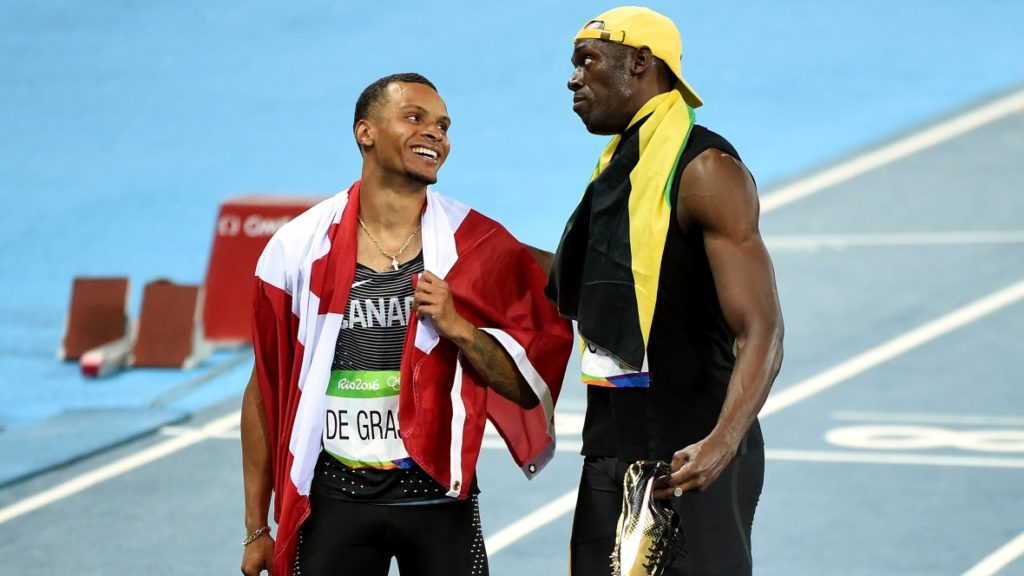The Gold Standard: Bolt, De Grasse bromance steals the show
Gold medal for making Usain Bolt run even faster…
In his post-race interview, Canadian sprinter and newly minted Olympic medallist Andre De Grasse mused that Usain Bolt was probably surprised at how much of a contest the 200-metre semifinal was. But De Grasse had no intention of handing the win to the big man, running 19.8 to Bolt’s 19.78, setting a new national record. And neither does De Grasse mean to make it easy for Bolt in the final. He’s running for gold, he said. The two also had some fun during the final stretch of the race, prompting many to wonder if the two could be a perfect fit for a bromance or buddy cop movie.
Usain Bolt and CAN’s Andre DeGrasse exchanging some smiles over the last 10 meters! Amazing how he flies! #Rio2016 pic.twitter.com/mEO0jU02qj
— Summer Sanders (@SummerSanders_) August 18, 2016
Gold medal for proving you belong in the Olympics…
Goes to the sport of wresting. In 2013, the IOC voted to remove wrestling from the 2020 Games in Tokyo, and a six-month campaign to reinstate it was mounted by the international federation, then known as FILA (in 2014 the body was renamed United World Wrestling). They succeeded, and as part of their promise to modernize the sport, the federation added two weight classes to the women’s side so that athletes now compete at 48, 53, 58, 63, 69 and 75 kilograms (in London they competed at 48, 55, 63 and 72 kg). The fruit of these changes was borne on Wednesday evening, when two first-time Olympians shared the bronze in the women’s 58 kg freestyle category. Marwa Amri, 27, of Tunisia won her country’s first Olympic wrestling medal, while 23-year-old Sakshi Malik won India’s first women’s medal in the sport, and the country’s first medal at the Rio Games. Canada also benefited from the expansion — Dorothy Yeats, 23, of Montreal, made it as far as the bronze-medal round in the 69-kg weight class, though was ultimately beaten by Anna Jenny Fransson of Sweden.
Gold medal for watching other teams win medals in Rio while you don’t win any…
Goes to 128 Olympic delegations (so far, anyway), including Cook Islands, Honduras and Nepal. That’s more than half. Now, forget Rio. Some 75 countries in the world have never won an Olympic medal ever, and that also includes Cook Islands (population of 14,974), Honduras and Nepal. Those nations have attended the past eight, 13, and 13 Summer Olympics respectively. You gotta hand it to them for keeping on. We in Canada have it good, by comparison, and over the years we’ve got to enjoy our athletes netting some 293 medals and counting.
Gold medal for finding a way to make everyone happy…
Goes to Brianne Theisen-Eaton, Canada’s bronze medallist in the heptathlon. Theisen-Eaton’s husband, Ashton Eaton, is the reigning Olympic and world champion in decathlon, and his main rival is Damian Warner, who has his sights set on gold this summer, As the decathlon got underway Wednesday, Theisen-Eaton found a way to cheer for family and country:
BrianneTheisen-Eaton on Twitter
Gold medal for deciding he’d better find out for himself…
Goes to Carmelo Anthony who ventured into Rio’s favelas and came to his own conclusions about the notorious neighbourhood.
Gold medal for causing world-class athletes to perform incredibly goofy rituals (which might actually make a difference)…
Goes to the crossbar in the high jump. During the men’s final on Tuesday night, and throughout Wednesday’s decathlon high-jump competition, the world’s best and brightest could be seen doing things like: talking to and then giving a brisk nod at the bar.
Syria’s Majd Eddin Ghazal, who finished seventh in the final was seen running really fast on the spot for three or four steps before approaching the bar and then rolling underneath it instead of vaulting over it (as did decathlete Oleksiy Kasiyanov at the height of 1.98 metres, even though he went on to clear 2.01), or leaning back to the left, throwing up your right arm, grimacing, slapping yourself twice on the face and then nailing every single jump all the way up to 2.38, as Canada’s Derek Drouin did en route to winning gold.
The sport itself is practically unthinkable — throwing yourself backward over a height of nearly eight feet. Is it any wonder it takes a very particular reckoning with that aluminum bar to make it over time and again?


